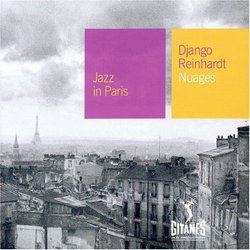Django Reinhardt - Plugged In
Gregory M. Wasson | Pinole, CA USA | 05/25/2008
(4 out of 5 stars)
"When most people think of Django Reinhardt at the top of his game, they think of the time from 1935 through 1937, possibly extending through 1939 when the war broke up the famous Quintette of the Hot Club of France. Stephane Grappelli, the marvelous violinist who had shared the stage with Django for many years, had fled to England to wait out the war. Reinhardt chose to stay with his gypsy compatriots in the wagon camps on the outskirts of Paris, continuing to enjoy the adulation of the many Parisian jazz fans who flocked to hear him in dark cramped "bal musette" nightclubs and large auditoriums alike.
The occupation of France by the Nazis paradoxically opened up new avenues of artistic expression for the musician whose fellow gypsies were being rounded up and sent to concentration camps in Poland and Germany. Without the confining structure of the Quintette, and the familiar interplay between Django and Stephane, Reinhardt was free to explore other styles and instruments. It was during this time that he took up an interest in what was then an exotic instrument - the "electric" guitar.
Although hollow bodied acoustic guitars with electric pickups had already been used by musicians such as Freddie Green with the Count Basie Orchestra, these musicians played the instrument much as they would have an acoustic guitar. They simply took advantage of the increased volume of sound to finally make themselves heard over the trumpets and saxophones. Only Charlie Christian had consistently explored the many possibilities that an electrified guitar offered, in the few short years he had played with the Benny Goodman band before his death at age 23 in the early 1940s.
"Jazz in Paris-Nuages" by Django Reinhardt offers an excellent sampling of the new direction of sound and form that Reinhardt developed during and after World War II. The recordings are taken primarily from the late 40s and early 50s. They dispel the notion that without the classic Quintette Django's playing suffered a general decline and lack of focus. Listening to the elegiac improvisations on tunes like "September Song," "Blues for Ike," or the title track, with their drawn out notes and tender shifts in tempo and volume, one can hear Reinhardt exploring the possibilities afforded by electrification. Combined with his compelling technique and unending musical curiosity, he brings a fresh and beautiful new sound to jazz.
It is not the music of the Quintette, with its astounding arpeggio runs and startlingly assured staccato improvisations. Although he shows that he can still play with his prewar speed, the ability to draw out the notes and play audibly even in the softest of passages produces solos of tremendous beauty and variety.
If you haven't heard Django Reinhardt on electric guitar, you have missed a great part what made him so special. Highly recommended."


 Track Listings (12) - Disc #1
Track Listings (12) - Disc #1